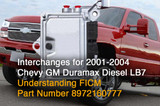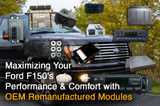Remanufactured vs. Refurbished Automotive Modules: Understanding the Key Differences
When it comes to replacing faulty or damaged automotive modules, vehicle owners have two primary options: remanufactured and refurbished modules. While both options can provide a cost-effective solution, they differ significantly in terms of quality, reliability, and performance.
What Are Refurbished Automotive Modules?
Refurbished automotive modules are used modules that have been repaired or rebuilt to working condition. The refurbishment process typically involves cleaning, inspecting, and replacing worn-out or damaged components. Refurbished modules may not meet the original equipment manufacturer's (OEM) specifications and are often sold with limited or no warranty.
What Are Remanufactured Automotive Modules?
Remanufactured automotive modules, on the other hand, are used modules that have been thoroughly inspected, disassembled, and rebuilt to meet or exceed OEM specifications. The remanufacturing process involves replacing all worn-out or damaged components with new or remanufactured parts, ensuring that the final product meets or exceeds the original manufacturer's standards. Remanufactured modules are often sold with a warranty and are considered to be of higher quality than refurbished modules.
Key Differences Between Remanufactured and Refurbished Automotive Modules
Here are the key differences between remanufactured and refurbished automotive modules:
- Quality: Remanufactured modules are built to meet or exceed OEM specifications, ensuring higher quality and reliability. Refurbished modules, on the other hand, may not meet OEM specifications.
- Warranty: Remanufactured modules are often sold with a warranty, providing peace of mind for the buyer. Refurbished modules typically do not come with a warranty.
- Process: The remanufacturing process involves a thorough inspection, disassembly, and rebuilding of the module, ensuring that all components meet or exceed OEM specifications. The refurbishment process is less rigorous and may involve only cleaning and repairing the module.
- Cost: Remanufactured modules are typically more expensive than refurbished modules, but they offer higher quality and reliability.
- Performance: Remanufactured modules are designed to perform like new, with all components meeting or exceeding OEM specifications. Refurbished modules may not perform as well, with potential reliability issues.
Types of Automotive Modules That Can Be Remanufactured
Various types of automotive modules can be remanufactured, including:
- Engine Control Modules (ECMs): ECMs regulate engine performance, fuel injection, and emissions. Remanufactured ECMs ensure optimal engine performance and efficiency.
- Transmission Control Modules (TCMs): TCMs manage transmission shifting, torque converter engagement, and clutch pack application. Remanufactured TCMs provide smooth and precise shifting.
- Fuel Injection Control Modules (FICMs): FICMs oversee fuel injection, ignition timing, and emissions control. Remanufactured FICMs ensure proper fuel delivery and engine performance.
- Turbo Actuators: Turbo actuators control the turbocharger's boost pressure, ensuring optimal engine performance and efficiency. Remanufactured turbo actuators provide reliable and precise control.
- Body Control Modules (BCMs): BCMs manage various vehicle systems, including lighting, wipers, and accessories. Remanufactured BCMs restore proper function to these systems.
Conclusion
In conclusion, while both remanufactured and refurbished automotive modules can provide a cost-effective solution, they differ significantly in terms of quality, reliability, and performance. Remanufactured modules offer higher quality, reliability, and warranty, making them a better choice for those who want a like-new module. Refurbished modules, on the other hand, may be a more budget-friendly option, but they come with lower quality and no warranty. Ultimately, the choice between remanufactured and refurbished automotive modules depends on your specific needs, budget, and priorities.
Recent Posts
-
Understanding FICM Part Number 8972160777 and Interchanges for 2001-2004 Chevy GM Duramax Diesel LB7
If you're looking to replace the Fuel Injection Control Module (FICM) in your 2001-2004 Chevy GM Dur …Apr 29, 2025 -
Troubleshooting and Replacing the 2005 Duramax FICM: A Comprehensive Guide
The Fuel Injection Control Module (FICM) is a critical component of your 2005 Duramax engine, respon …Apr 29, 2025 -
Maximizing Your Ford F150's Performance and Comfort with OEM Remanufactured Modules
As a Ford F-150 owner, you know how important it is to keep your vehicle running smoothly and effici …Apr 29, 2025




